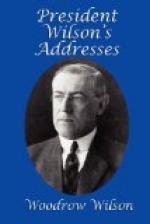No American could stand in this place to-day and think of the circumstances which we are come together to celebrate without being most profoundly stirred. There has come over me since I sat down here a sense of deep solemnity, because it has seemed to me that I saw ghosts crowding—a great assemblage of spirits, no longer visible, but whose influence we still feel as we feel the molding power of history itself. The men who sat in this hall, to whom we now look back with a touch of deep sentiment, were men of flesh and blood, face to face with extremely difficult problems. The population of the United States then was hardly three times the present population of the city of Philadelphia, and yet that was a Nation as this is a Nation, and the men who spoke for it were setting their hands to a work which was to last, not only that their people might be happy, but that an example might be lifted up for the instruction of the rest of the world.
I like to read the quaint old accounts such as Mr. Day has read to us this afternoon. Strangers came then to America to see what the young people that had sprung up here were like, and they found men in counsel who knew how to construct governments. They found men deliberating here who had none of the appearance of novices, none of the hesitation of men who did not know whether the work they were doing was going to last or not; men who addressed themselves to a problem of construction as familiarly as we attempt to carry out the traditions of a Government established these 137 years.
I feel to-day the compulsion of these men, the compulsion of examples which were set up in this place. And of what do their examples remind us? They remind us not merely of public service but of public service shot through with principle and honor. They were not histrionic men. They did not say—
Look upon us as upon those who shall hereafter be illustrious.
They said:
Look upon us who are
doing the first free work of constitutional
liberty in the world,
and who must do it in soberness and truth, or
it will not last.
Politics, ladies and gentlemen, is made up in just about equal parts of comprehension and sympathy. No man ought to go into politics who does not comprehend the task that he is going to attack. He may comprehend it so completely that it daunts him, that he doubts whether his own spirit is stout enough and his own mind able enough to attempt its great undertakings, but unless he comprehend it he ought not to enter it. After he has comprehended it, there should come into his mind those profound impulses of sympathy which connect him with the rest of mankind, for politics is a business of interpretation, and no men are fit for it who do not see and seek more than their own advantage and interest.




